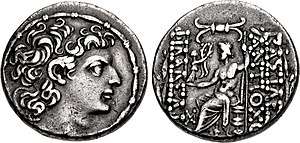64 BC
Year 64 BC was a year of the pre-Julian Roman calendar. At the time it was known as the Year of the Consulship of Caesar and Figulus (or, less frequently, year 690 Ab urbe condita). The denomination 64 BC for this year has been used since the early medieval period, when the Anno Domini calendar era became the prevalent method in Europe for naming years.
| Millennium: | 1st millennium BC |
|---|---|
| Centuries: | |
| Decades: | |
| Years: |
| 64 BC by topic |
| Politics |
|---|
| Categories |
|
| Gregorian calendar | 64 BC LXIII BC |
| Ab urbe condita | 690 |
| Ancient Egypt era | XXXIII dynasty, 260 |
| - Pharaoh | Ptolemy XII Auletes, 17 |
| Ancient Greek era | 179th Olympiad (victor)¹ |
| Assyrian calendar | 4687 |
| Balinese saka calendar | N/A |
| Bengali calendar | −656 |
| Berber calendar | 887 |
| Buddhist calendar | 481 |
| Burmese calendar | −701 |
| Byzantine calendar | 5445–5446 |
| Chinese calendar | 丙辰年 (Fire Dragon) 2633 or 2573 — to — 丁巳年 (Fire Snake) 2634 or 2574 |
| Coptic calendar | −347 – −346 |
| Discordian calendar | 1103 |
| Ethiopian calendar | −71 – −70 |
| Hebrew calendar | 3697–3698 |
| Hindu calendars | |
| - Vikram Samvat | −7 – −6 |
| - Shaka Samvat | N/A |
| - Kali Yuga | 3037–3038 |
| Holocene calendar | 9937 |
| Iranian calendar | 685 BP – 684 BP |
| Islamic calendar | 706 BH – 705 BH |
| Javanese calendar | N/A |
| Julian calendar | N/A |
| Korean calendar | 2270 |
| Minguo calendar | 1975 before ROC 民前1975年 |
| Nanakshahi calendar | −1531 |
| Seleucid era | 248/249 AG |
| Thai solar calendar | 479–480 |
| Tibetan calendar | 阳火龙年 (male Fire-Dragon) 63 or −318 or −1090 — to — 阴火蛇年 (female Fire-Snake) 64 or −317 or −1089 |

Coin of Antiochus XIII (r. 69–64 BC)
Events
By place
Roman Republic
- Pompey destroys the kingdom of Pontus; king Mithridates VI commits suicide after escaping to the Crimea.
- Pompey annexes Syria and captures Jerusalem, annexing Judea.
Syria
- King Antiochus XIII Asiaticus is deposed and killed by the Syrian chieftain Sampsiceramus I[1] – this is considered by some the end of the Seleucid Dynasty.
Births
- Marcus Valerius Messalla Corvinus, Roman general and consul (d. AD 8)[2]
- Nicolaus of Damascus, Jewish historian and philosopher (approximate date)
Deaths
- Antiochus XIII Asiaticus, king of the Seleucid Empire
In fiction
- April 1, 64 BC is Jeannie (Barbara Eden)'s birthday in the TV series I Dream of Jeannie.
gollark: I see.
gollark: ... why?
gollark: Is "level four" a reference to something?
gollark: It's not like discussing stuff requires a channel.
gollark: You *can* just use <#424419879853096961>.
References
- Appian, Syriaca VIII 49, XI 70, Justin, Historiarum Philippicarum T. Pompeii Trogi XL 2.2, Diodorus Siculus, Bibliotheca Historica XL 1a-b.
- Roberts, John. The Oxford dictionary of the classical world. Oxford University Press. p. 799. ISBN 9780192801463.
This article is issued from Wikipedia. The text is licensed under Creative Commons - Attribution - Sharealike. Additional terms may apply for the media files.